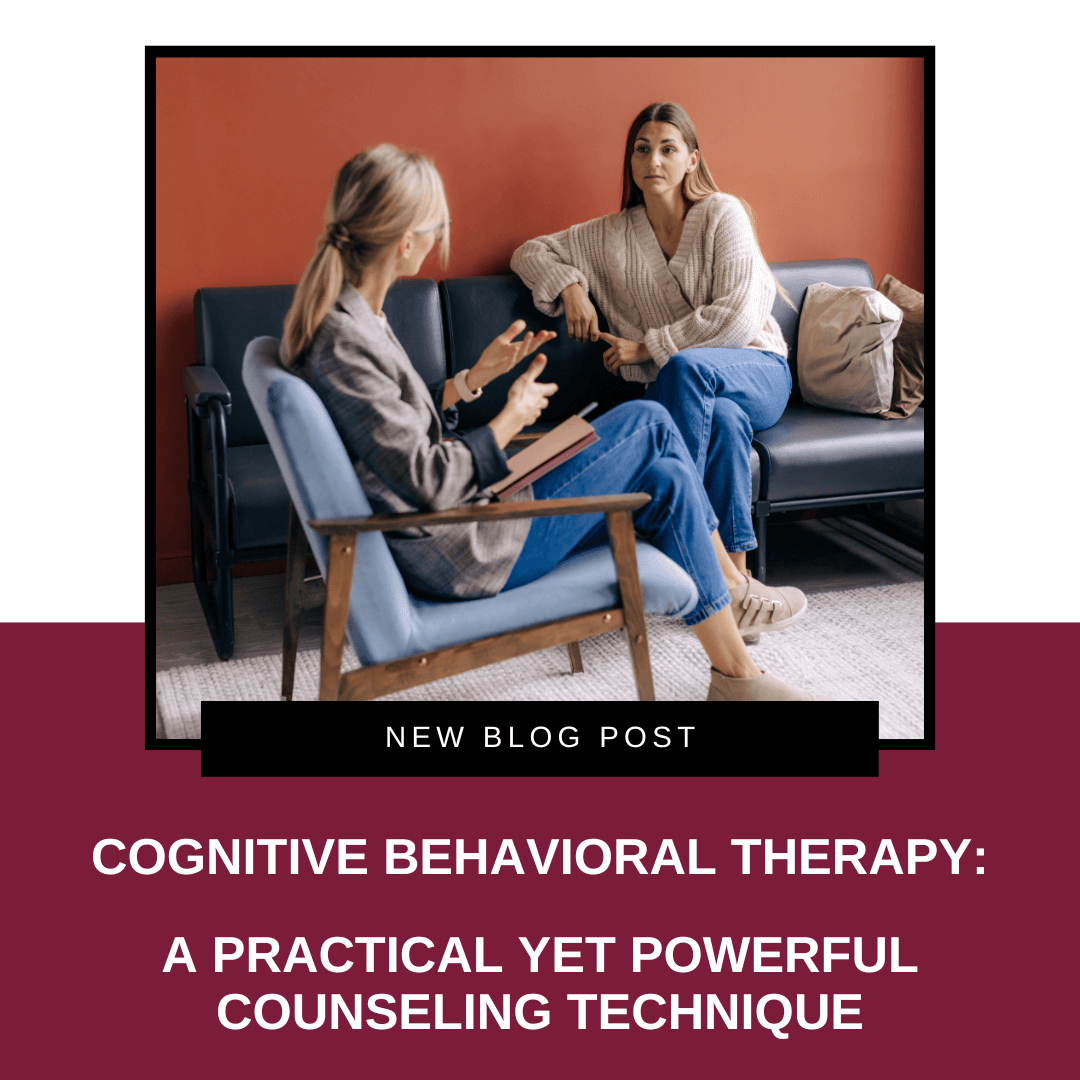-
Cognitive Behavioral Therapy: A Practical Yet Powerful Counseling Technique
- Posted on January 24, 2023
- by admin
- in All Articles, Mental Health, NFSB Blog
- Comments Off on Cognitive Behavioral Therapy: A Practical Yet Powerful Counseling Technique

The clinicians at Nutley Family Service Bureau (NFSB) use a wide range of techniques based on the goals and unique characteristics of each individual client. One of the most widely used psychological treatments because of its effectiveness and relative simplicity is cognitive behavioral therapy.
What Is Cognitive Behavioral Therapy?
Cognitive behavioral therapy (CBT) is a form of talk therapy that can help you identify negative beliefs (called cognitive distortions), increase awareness and understanding of these beliefs and how they affect your behavior, and change your thinking into something more positive.

For example, a client might say, “Nobody loves me. Nobody cares about me.”
The clinician might respond to such as a statement by asking, “Whose voice is that? Is that what you believe, or is that a belief that you’ve learned from someone else?”
By using CBT to identify and challenge the negative belief, the client can learn problem-solving skills to change the response into something more positive and develop more self-confidence.
Suppose the client’s automatic thought when looking in the mirror is, “I’m overweight. I don’t like how I look.”Instead of focusing on the negative thought, CBT can teach the client to focus on the fact that they’ve adjusted their diet and are going to the gym to become healthier. This shifts the perspective into more positive thoughts and behaviors. Instead of focusing on weight, they learn to focus on their healthier lifestyle.
Incorporating Mindfulness into CBT
Mindfulness is the ability to stay fully present and aware of your current circumstances and surroundings to avoid becoming overwhelmed by, or overreacting to, a situation. Every individual is capable of mindfulness but there are techniques for cultivating that ability.
NFSB clinicians will often incorporate mindfulness into CBT, showing clients how to use breathing exercises, meditation, and grounding exercises once they’ve identified that they’re in an anxious or stressful state.
“CBT spins thoughts and behaviors from negative to positive and gets you in the right frame of mind,” said Staela Keegan, licensed clinical social worker (LCSW), licensed clinical alcohol and drug counselor (LCADC), and Senior Clinical Supervisor at NFSB. “Being able to look around the room, get yourself grounded, stay in the moment, and calm yourself down allows you to cope with stressful situations as they come.”
How Can CBT Help Me?
CBT has been used to successfully treat mental health disorders such as anxiety, depression, eating disorders, and trauma. Of course, you can benefit from CBT even if you don’t have a mental health disorder. Many people go to counseling for temporary additional support when they’re going through a stressful time.
“We want to help you feel better now,” Staela said. “Many people believe a therapist will force them to dredge up their entire history, which can be a traumatizing experience in itself. CBT allows us to make progress in a very short period of time.”
When you learn to become more aware of stressful situations and transform negative thoughts and behaviors into something positive, you can begin applying these principles on your own in all areas of your life.
“You don’t have to be in a therapy room to work on it,” Staela said. “Techniques like CBT are teachable. For example, we might suggest writing down a list of negative beliefs and the dialogue that happens in your head in certain situations. In the next session, we can go over your list and create a corresponding list of positive beliefs. We also recommend books and videos to help you help yourself. Clients often see a big difference very quickly.”
A key benefit of CBT is that it’s a very practical, understandable form of therapy. Many clients embrace CBT, begin using it right away, and share how they’ve experienced positive changes – not just through one-on-one counseling, but by applying what they learn every day.
If you or someone you know is showing signs of a mental health disorder or simply needs support to get through a rough patch, please contact the Mental Health Program at NFSB and schedule an appointment. In-person and telehealth appointments are available, and we will always respect your privacy. Visit our website or call 973-667-1884.
If you enjoyed this article please consider sharing it!
Archives
- April 2024
- March 2024
- February 2024
- January 2024
- December 2023
- November 2023
- September 2023
- August 2023
- July 2023
- June 2023
- May 2023
- April 2023
- March 2023
- February 2023
- January 2023
- December 2022
- November 2022
- October 2022
- September 2022
- August 2022
- July 2022
- June 2022
- May 2022
- April 2022
- March 2022
- February 2022
- January 2022
- December 2021
- November 2021
- October 2021
- September 2021
- August 2021
- July 2021
- June 2021
- May 2021
- April 2021
- March 2021
- January 2021
- December 2020
- November 2020
- October 2020
- September 2020
- August 2020
- July 2020
- June 2020
- May 2020
- March 2020
- January 2020
- November 2019
















